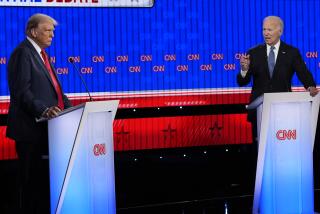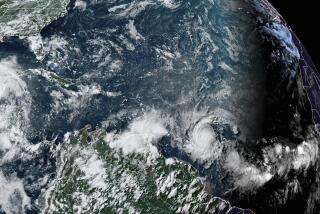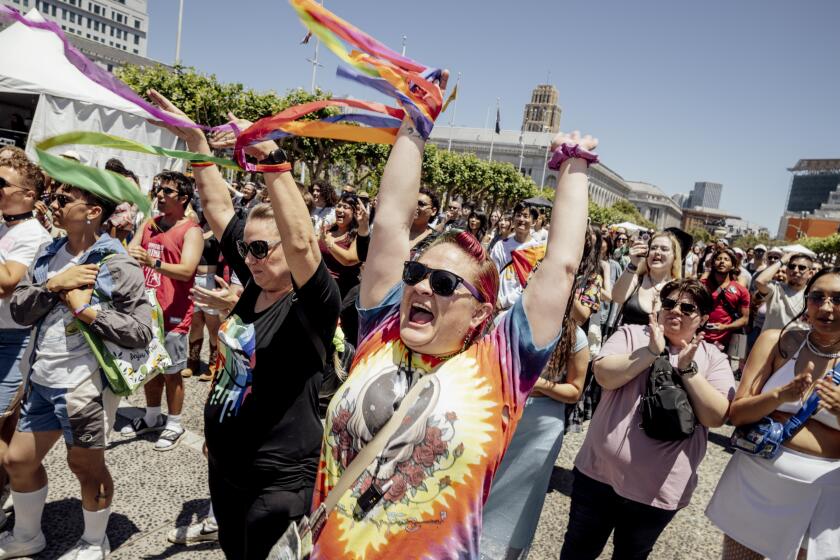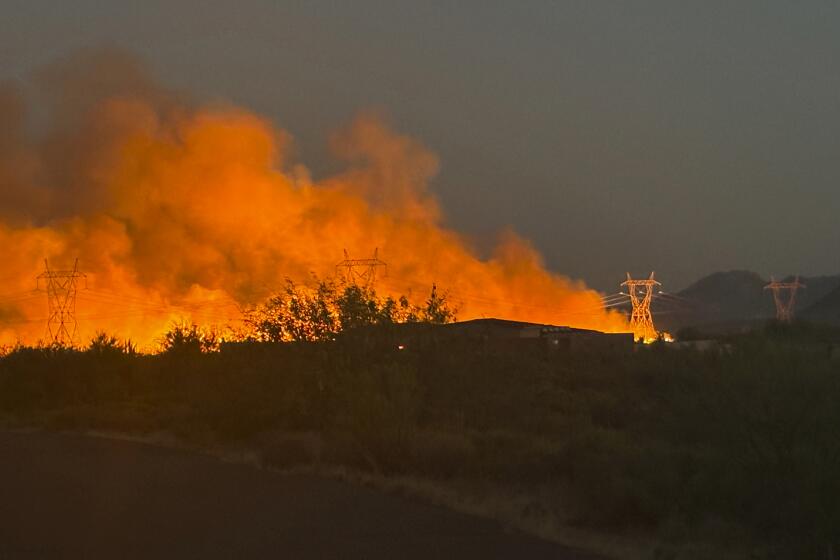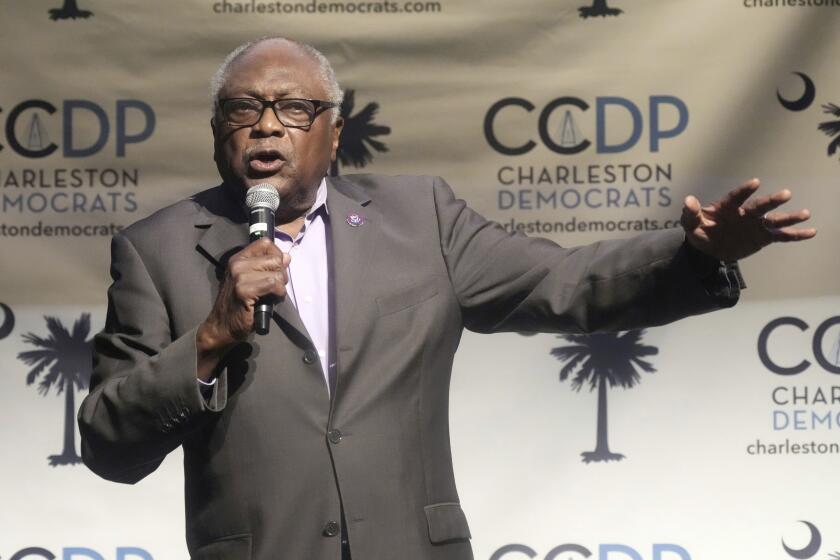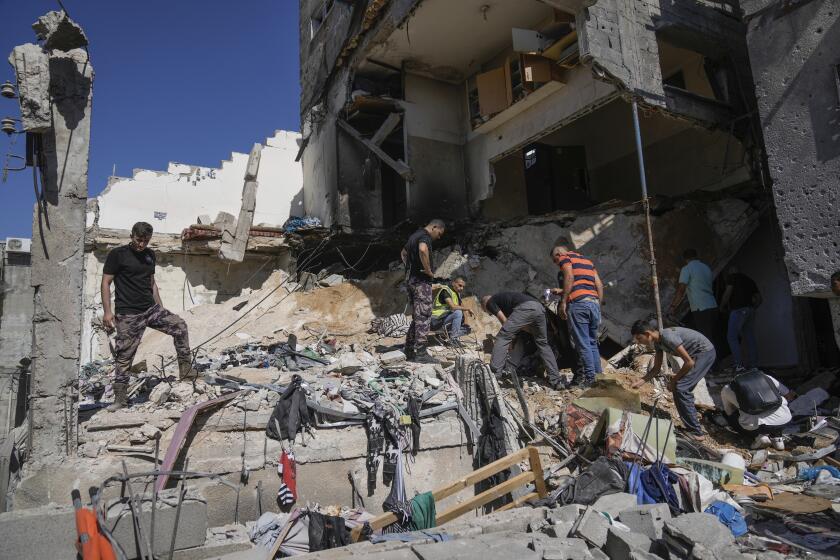CIA-FBI Feuding Runs Deep
The controversy over who knew what in the days and weeks before Sept. 11 has vaulted the rivalry between the FBI and CIA--one of the oldest back-fence feuds in the nation’s capital--outside the bounds of conventional controversy.
The question of why the deadliest terror plot in U.S. history went unstopped has exacerbated problems at the nation’s already-troubled intelligence agencies. And disclosures made in the last two weeks indicate that, despite reform efforts at both the FBI and CIA, the interagency sparring is only getting worse.
“What we’ve seen in the past two weeks is changing everything,” a Bush administration official familiar with CIA and FBI operations said Saturday. “There will be more changes. It has made it apparent that we need to go deeper.”
From scandals of years past--Watergate, for example--have come major reforms. Already, pressure has grown for a broader inquiry into the intelligence agencies’ operations and deeper reforms than most Washington officials wanted or thought likely just a few weeks ago. There is, for example, growing support for an independent commission to investigate the agencies.
Both the CIA and the FBI are well into their post-9/11 reorganization plans, which are designed to make them work better together. FBI Director Robert S. Mueller III has brought on board several CIA officials to work at FBI headquarters, and FBI agents have a stronger presence at the CIA’s sprawling Virginia complex.
Perhaps most telling, top FBI and CIA officials--often Mueller and CIA Director George J. Tenet--gather each morning to go over the terrorism “threat matrix” so they can brief President Bush together.
But the recent disclosures suggest that the bickering, foot-dragging and bureaucratic gamesmanship continue.
The latest flare-up started with a leak that the CIA warned Bush of possible terrorist hijackings more than a month before Sept. 11. It continued with revelations that a Phoenix FBI agent warned of possible terrorist infiltration of flight schools. And it was capped by the detailed accusations of high-level Washington failures by an FBI lawyer in Minneapolis.
“Obviously it is still going on,” another Bush administration official said of the CIA-FBI rivalry. “And we all hope that our leaders ... can find a way to get their agencies to stop worrying about protecting themselves and worry more about protecting all of us, even if it means taking a couple of hard knocks institutionally.”
In the twilight struggle of the Cold War, when lives seemed secure at home, U.S. intelligence officials could battle foreign enemies without missing a step in their fights against political and bureaucratic rivals.
If CIA superiors seemed blind to a mole like Aldrich H. Ames, or if a Robert Philip Hanssen could betray his country from the comfort of an FBI executive office, the country at large took such setbacks in stride.
That may no longer be true.
Today, when warnings of horrific new dangers pour out almost daily and a natural gas explosion at an Encino apartment building sends shivers down the whole country’s spine, public tolerance for the old infighting may be evaporating.
The question now is whether Mueller’s proposed changes at the FBI go far enough--whether the government should simply shake up the entrenched bureaucracy or reinvent the bureau in a far more dramatic way than Mueller plans.
“In some ways, this is out of his hands now,” the Bush administration official said.
But in the meantime, the debate is a hardball contest of leaks and spin, fought by the agencies themselves but also by partisans on the Hill, in news media and in the policy establishment. It is a potent formula that is already nicking careers.
Last week it was that of Mueller himself, who had only been on the job a week when Sept. 11 arrived. The broadside by Minneapolis-based agent Coleen Rowley--in a letter leaked by members of Congress--criticized Mueller personally, saying he made misleading public statements about how the FBI handled the terrorism investigation before and after Sept. 11, downplaying and even leaving out details that would make the bureau look bad.
Sen. Charles E. Grassley (R-Iowa), a fierce FBI critic, lambasted Mueller for withholding Rowley’s letter, vowing, “A cover-up is not going to work.”
Another Republican, maverick Richard C. Shelby of Alabama, ranking minority member of the Senate Intelligence Committee, has repeatedly demanded the head of Tenet, a holdover from Bill Clinton’s presidency. He has also discomfited a Republican White House and many of his Senate colleagues by spreading the alleged shortcomings in the CIA and FBI across the public record.
Law enforcement officials shoot back that Congress itself tied the hands of the CIA and the FBI in the 1970s by restricting the gathering of intelligence--barriers that were lifted after Sept. 11 with the passage of the Patriot Act, which also encourages the sharing of information among the FBI, CIA and National Security Council.
CIA and FBI officials have been maneuvering frantically to shift blame for missing signs of impending domestic terrorism. Both have resorted to orchestrated news leaks and spin-doctoring.
In the most fundamental split, the FBI says the Sept. 11 plot was hatched overseas--in the CIA’s domain--while the agency notes that the 19 hijackers roamed extensively through the FBI’s U.S. territory.
Until recently, no one outside a small circle of government officials knew that on Aug. 6, more than a month before the attacks, the CIA’s daily briefing for the president included a warning that Al Qaeda might contemplate hijacking U.S. aircraft. Public disclosure of the briefing created significant political problems for the White House but also cast the agency in the flattering light of having issued an unheeded warning.
Normally, daily intelligence briefings for the president are among the CIA’s most closely guarded secrets. How did congressional investigators learn about the Aug. 6 briefing?
The answer, congressional sources said, is that they were tipped off by officials in the CIA’s office of congressional affairs.
Congressional aides described it as an atypically cooperative gesture from a CIA office that had previously been accused by lawmakers of hindering the probe.
“It was like, ‘Gee, you might want to look at Aug. 6,’” said one aide. “‘We hear that was pretty interesting.”’
The information was leaked to the media two days later and was first mentioned on the CBS Evening News on May 15.
The CIA has also aimed elbows at the FBI. The agency particularly seemed to enjoy fallout from the recent disclosure of the so-called Phoenix memo of July 10, in which an FBI agent in Arizona urged bureau headquarters to investigate Middle Eastern men possibly training for terrorist missions at U.S. flight schools.
The leak of that memo--and the FBI’s failure to act on it--began a firestorm of criticism.
The CIA seemed to pile on. The agency first declared that it hadn’t received the memo until recently; a CIA official then described it as a “remarkable document” that almost certainly would have set off a significant inquiry if the FBI had shared it before it was too late.
Within a day, the FBI anonymously declared that it had shared at least portions of the memo with the CIA. So if the bureau was in the soup, the CIA was with it.
The feud between the CIA and the FBI goes back more than half a century and reflects divergent cultures that all agree must change.
In the 1940s, when the Central Intelligence Agency was created to coordinate America’s response to the emerging threat of global communism, the new agency was barred from operating inside the United States. But it received sole responsibility for intelligence and counter-intelligence overseas.
That meant the FBI had to withdraw dozens of agents from posts abroad, which infuriated J. Edgar Hoover, who had made his “G-men” legendary, zealously guarding their turf and his own.
And from the beginning, the cultures of the two institutions could not have been more different. The CIA was a self-consciously cosmopolitan and intellectual elite, patterned after the Oxbridge traditions of the British Secret Service and molded in the blue-blooded Ivy League image of its first director, Allen Dulles.
The FBI saw itself as equally elite but was made of commoner clay. If the CIA was disdainfully aristocratic, the FBI was defiantly middle class, with its lawyers and accountants in their stodgy but mandatory black shoes, white shirts and felt hats.
Even without those cultural differences, the FBI and the CIA face each other across a chasm:
One is devoted to espionage, operating overseas and outside the restrictions of U.S. law. Its goal is gathering information and subverting the enemy by any means.
It subscribes to Winston Churchill’s dictum that, “In wartime, truth is so precious that she should always be attended by a bodyguard of lies.” And for the CIA, all time is wartime.
The FBI, by contrast, is a law enforcement organization, dedicated to prosecuting criminals, not just gathering information.
And it is answerable to the strict standards of the American legal system.
When it has fallen short of those standards, as critics say it did during the civil rights movement of the 1960s, its pursuit of radicals during the 1970s and more recently with the Branch Davidians and at Ruby Ridge, it has been harshly criticized, while the CIA has largely escaped such scrutiny for its dirty tricks abroad.
But the cultures share at least one important characteristic: Both tend to feel that no outsider can judge them and both put loyalty to the organization above all else.
That’s why the letter from the FBI’s Rowley broke like a thunderclap late last week. It was that rarest of things: criticism from inside.
And, sure enough, it became public through a leak.
*
Times staff writers Bob Drogin and Nick Anderson contributed to this report.
More to Read
Start your day right
Sign up for Essential California for news, features and recommendations from the L.A. Times and beyond in your inbox six days a week.
You may occasionally receive promotional content from the Los Angeles Times.

